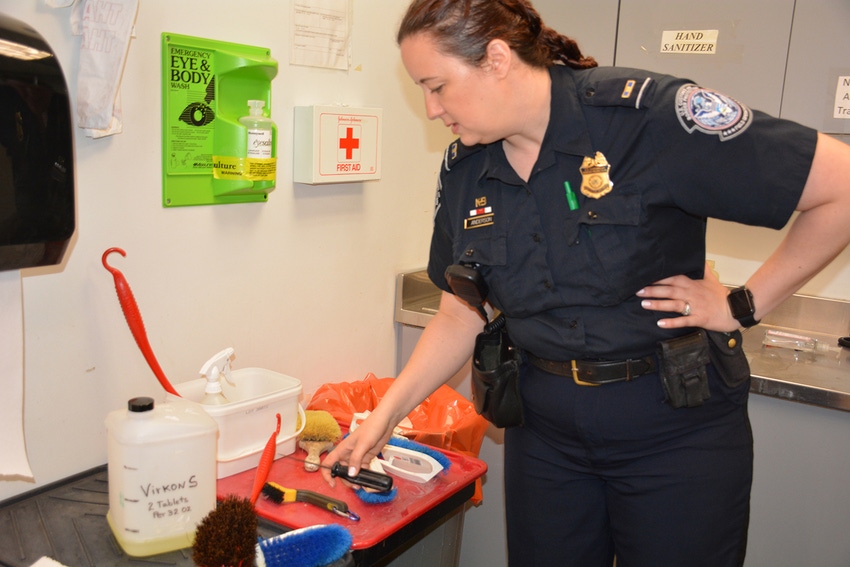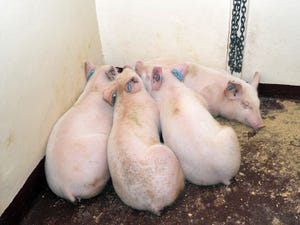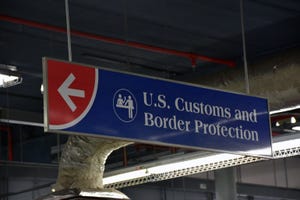During foot-and-mouth disease outbreak, everyone was declaring farm visits
While we may be doing a superb job following all the rules when returning to the United States, we might want to remind our family, friends and international guests to #BeAwareandDeclare.

This week I had the privilege to go behind the scenes at Chicago’s O’Hare International Airport and see the U.S. Customs and Border Protection agricultural specialists and “Beagle Brigade” in action. It was amazing to see this week’s collection of prohibited pork products, which included a giant pork leg, bacon and various other cuts, as well as to see Bettie the beagle pounce on a roller-bag in baggage claim that just so happened to have pork inside.
With 40 to 60 international flights coming in each day to O’Hare, the CBP agricultural specialists stay busy questioning passengers about potential prohibited agricultural products in their luggage and chauffeuring their companions with a keen sense of smell around Terminal 5. But one task the agricultural specialists are not asked to do very often is cleaning and disinfecting shoes, clothing and other items.
“I haven't seen anyone in a very long time declare to me they’ve been on a farm, in any country, whether that’s African swine fever or not,” says Jessica Anderson, a CBP agricultural specialist at Chicago O’Hare International Airport.
For Anderson, who started her career with CBP 18 years ago at the Minneapolis-St. Paul International Airport during the height of the foot-and-mouth disease outbreak in England, passengers declaring they’ve been anywhere near livestock or agriculture has almost taken a 360. During the FMD outbreak, Anderson spent much of her day cleaning and disinfecting shoes, golf clubs and any other items that could have been exposed to the virus.
“Back then, everybody was declaring that they were on a farm. The awareness level was a lot higher because of the video feeds of the piles of dead cows burning and you would see the videos of the farmers in tears,” Anderson says. “You’d hear stories of farmers committing suicide, you know, all of that stuff. It was just awful.”
Anderson says those images resonated with the general public and helped them realize the impact it would have here in the United States, so they were more apt to declare items upon return.
“I feel like in some respects that might be missing from this day and age. We do put out there to declare items. We do put out there to declare if you are on a farm,” Anderson says. “I just think the message is lost sometimes when we focus all on food and not on everything else too.
“If international travelers visit a petting zoo or see wild pigs or any other livestock wandering around, where they are visiting, they should really be declaring that too,” Anderson says.
Who are the ones declaring at O’Hare? Anderson says most often it’s our U.S. pork producers.
“Because they don’t want to bring it here and a lot of times, they’ll declare it, but they don’t have any of the items with them,” Anderson says. “They’re still declaring it because they see the question and it says were you on a farm? And they say, ‘yeah, of course I was.’”
Anderson says while that producer behavior is ideal, it’s not something other international travelers are implementing upon return. Since the beagle brigade is only trained to sniff out apple, mango, citrus, beef and pork, the hounds are not going to be able to detect if a traveler is lying about his or her whereabouts.
It all comes down to telling the truth and having some patience.
“I understand the customs process is very long,” Anderson says. “Some days when you have to wait for like a half an hour, an hour to get through and you’re frustrated, you just want to get out. The last thing you want to do is declare something for an extended stay back in secondary.”
But Anderson says that short extended stay in customs means so much more to U.S. agriculture.
“Five, 10 minutes, tops out of your day, to save America,” Anderson says. “I mean it’s not as big a deal as they think it is. It’d be a bigger deal if they didn’t declare.”
While we may be doing a superb job following all the rules and procedures when returning to the United States, we might want to remind our family, friends and international guests to #BeAwareandDeclare.
About the Author(s)
You May Also Like





